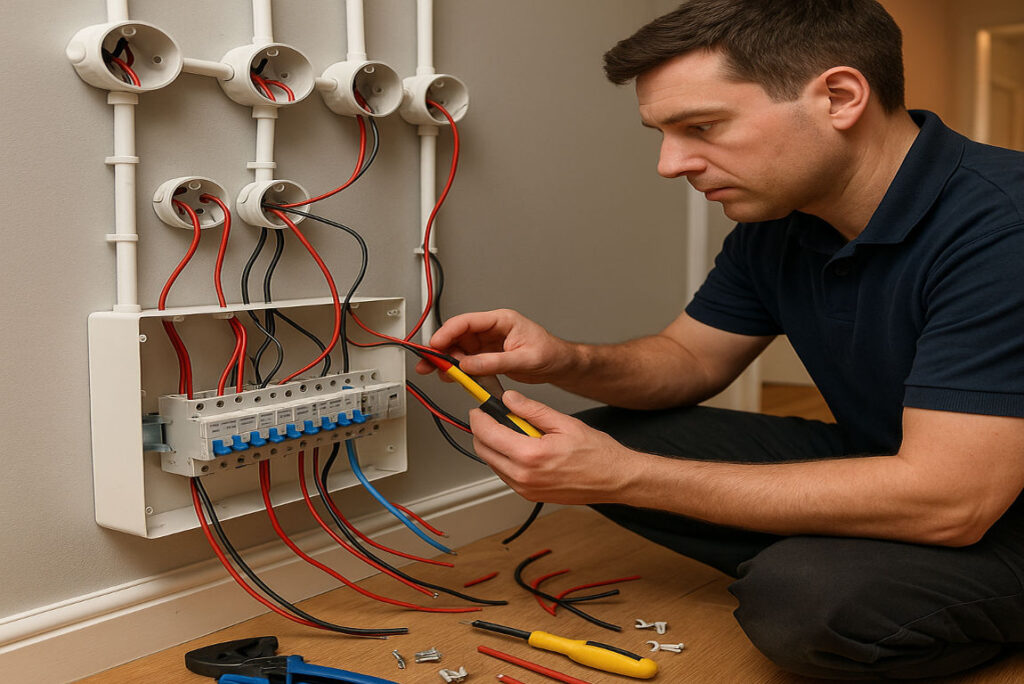Rewiring a house is one of the most significant electrical upgrades a homeowner can undertake. It’s not just about replacing old wires; it’s about ensuring safety, compliance with modern standards, and future-proofing your home for years to come. If you’re wondering, “How much does it cost to rewire a house in the UK?” this comprehensive guide will walk you through everything you need to know.
From understanding what rewiring entails to estimating costs and identifying factors that influence pricing, we’ll cover it all.
What is House Rewiring?
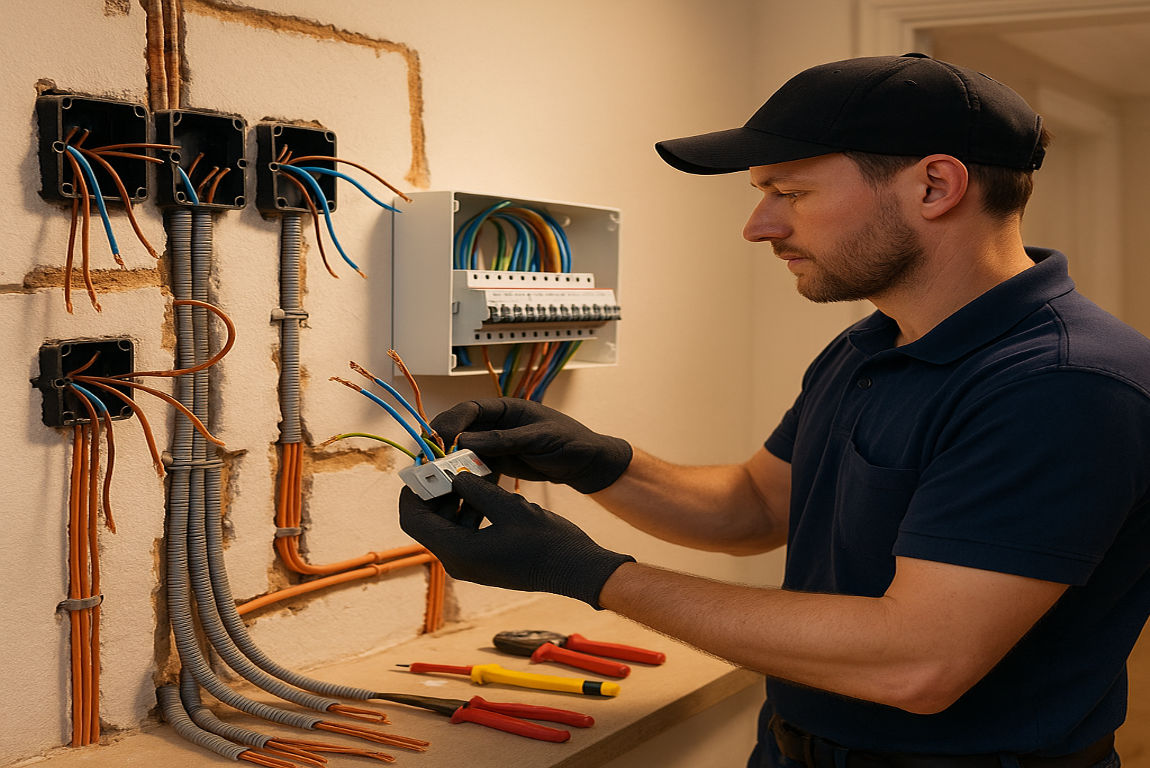
Understanding House Rewiring
House rewiring involves replacing the electrical wiring in your home to ensure it meets modern safety standards. Over time, electrical systems can become outdated or unsafe, especially in older properties. Rewiring typically involves removing old wires, installing new ones, and upgrading sockets, switches, and the consumer unit (also known as a fuse box).
Why is Rewiring Important?
Rewiring is crucial for several reasons:
- Safety: Old or damaged wiring can pose a fire hazard or lead to electrical shocks.
- Compliance: UK regulations require homes to meet specific electrical standards, especially if you’re selling or renting the property.
- Efficiency: Modern wiring supports today’s energy demands, including smart home systems and high-powered appliances.
Signs Your House Needs Rewiring
Are you unsure if your home needs rewiring? Look out for these warning signs:
- Flickering or dimming lights
- Frequent tripping of circuit breakers
- Old-style fuse boxes with ceramic fuses
- Discolored or scorched sockets and switches
- A burning smell near outlets or wiring
- Wiring encased in fabric or rubber insulation (common in homes built before the 1970s)
If you notice any of these issues, it’s time to consult a qualified electrician.
Why Might You Need to Rewire Your House?
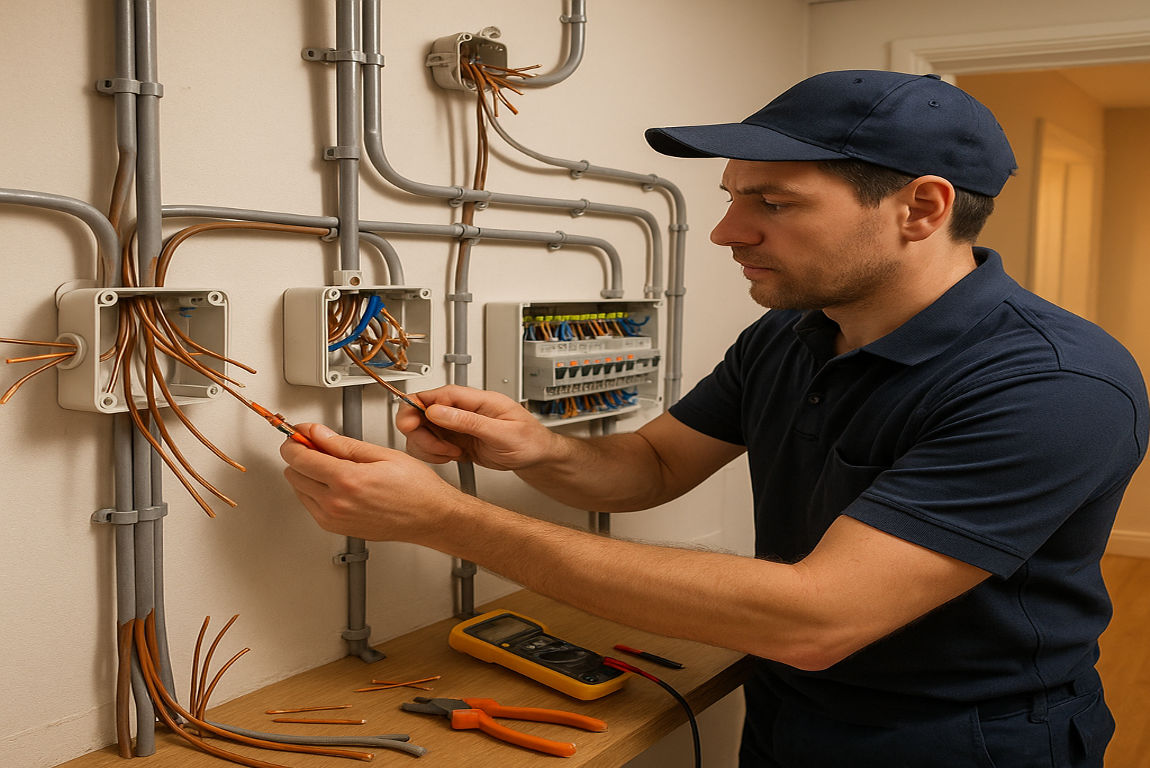
Key Reasons for Rewiring
There are several scenarios where rewiring becomes necessary:
You may also read (are tenants responsible for house plumbing philippines).
- Outdated Wiring
- Homes built decades ago often have wiring that doesn’t meet modern safety standards. For example, homes built before the 1970s may have aluminum or rubber-insulated wiring, which is prone to deterioration.
- Safety Hazards
- Faulty wiring is one of the leading causes of electrical fires. Rewiring eliminates risks like exposed wires, overloaded circuits, and outdated fuse boxes.
- Home Renovations or Extensions
- Adding new rooms or upgrading your home often requires additional circuits and sockets, making rewiring a necessary step.
- Compliance with UK Standards
- If you’re selling or renting your property, it must comply with current electrical regulations, including having an Electrical Installation Condition Report (EICR).
How to Spot the Need for Rewiring
In addition to the signs mentioned earlier, consider rewiring if:
- Your home hasn’t been rewired in the last 25-30 years.
- You’re experiencing frequent power outages or blown fuses.
- You’re planning a major renovation or installing high-powered appliances.
How Much Does It Cost to Rewire a House in the UK?
Typical Cost Range
The cost of rewiring a house in the UK varies depending on factors such as property size, location, and the complexity of the job. On average, you can expect to pay between £1,500 and £9,000. Here’s a breakdown of costs by property type:
Property TypeAverage CostTypical Duration
1-bed flat £3,000–£4,800 3–5 days
2-bed house/flat £3,500–£5,800 3–5 days
3-bed house £4,450–£8,000 5–7 days
4-bed house £6,080–£9,380 7–10 days
5-bed house £7,500–£12,500 10–14 days
Regional Price Differences
Location plays a significant role in pricing. For instance:
- London and the South East: Costs tend to be higher due to increased labor rates.
- Northern England and Scotland: Prices are generally lower.
Why Get Multiple Quotes?
Rewiring is a significant investment, so it’s essential to get at least three quotes from qualified electricians. This ensures you’re getting a fair price and helps you compare services.
Factors That Affect the Cost of Rewire a House in the UK
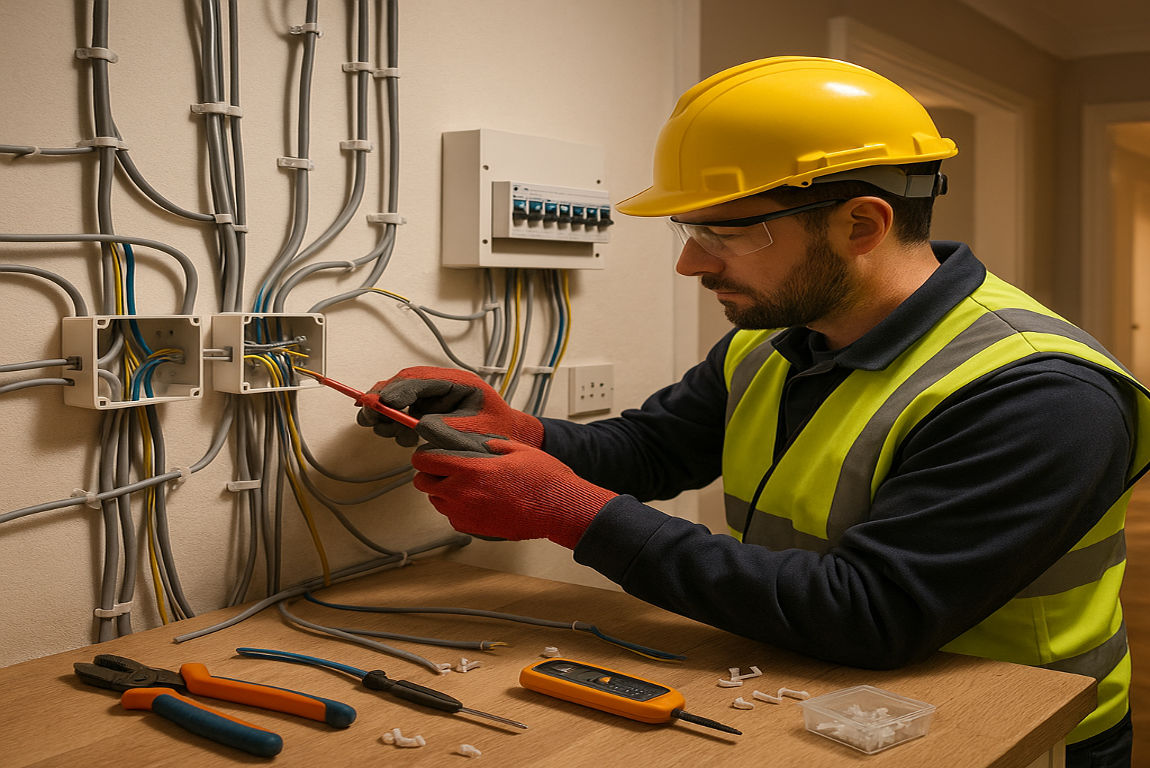
Several factors influence the cost of rewiring. Let’s break them down:
Size and Type of Property
Larger homes require more wiring, sockets, and switches, which increases costs. For example, rewiring a 1-bed flat is significantly cheaper than a 5-bed detached house.
Age and Condition of Existing Wiring
Older homes with outdated or damaged wiring may require more extensive work, such as removing hazardous materials like asbestos.
Accessibility
Rewiring an empty or unfurnished property is quicker and cheaper than working in a fully furnished, occupied home.
You may also read (unlocking the secrets of top home real estate producers).
Number of Sockets and Switches
The more sockets, switches, and lighting points you need, the higher the cost.
Location
As mentioned earlier, labor costs vary by region, with London being the most expensive.
Additional Upgrades
Upgrading to a modern consumer unit or installing smart home technology can add to the overall cost.
Plastering and Decorating
Rewiring often involves cutting into walls, so you may need to budget for plastering and redecorating afterward.
Inspection and Certification
An Electrical Installation Condition Report (EICR) costs between £100 and £300 and is essential for compliance.
What’s Included in a Full House Rewire?
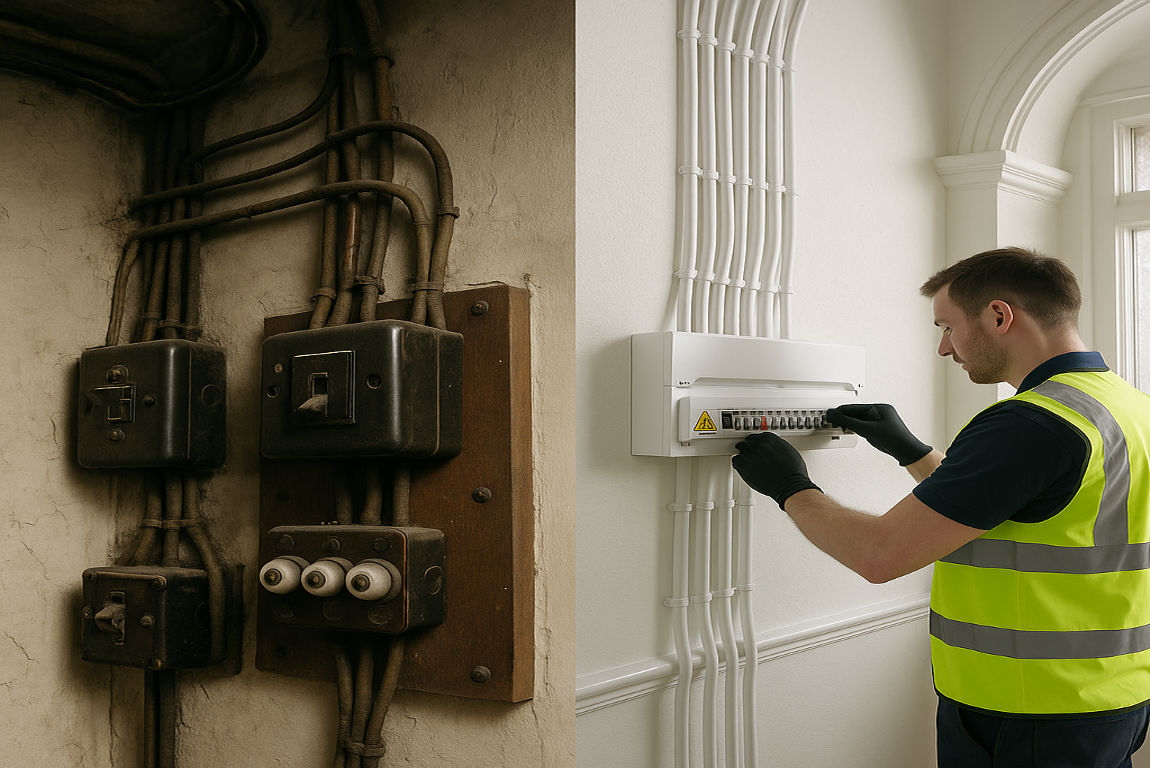
When you hire an electrician for a full rewire, here’s what’s typically included:
- Removal of old wiring
- Installation of new wiring, sockets, and switches
- Upgrading the consumer unit (fuse box)
- Circuit testing and certification (EICR)
- Minor plastering to fill holes
Common Exclusions
- Major plastering or redecorating
- New flooring or carpets
- Premium fixtures or smart home accessories
Step-by-Step Guide: How to Estimate Your House Rewire Cost
Follow these steps to estimate your rewiring costs:
- Assess Your Property Size and Type
- Use the cost table above as a starting point.
- Check the Current Condition of Your Wiring
- Older or damaged wiring may increase costs.
- Decide on Upgrades
- Determine the number of sockets, switches, and lighting points required.
- Factor in Location and Accessibility
- Consider regional price differences and whether your home is furnished.
- Add Inspection and Certification Costs
- Budget an additional £100–£300 for an EICR.
- Get Multiple Quotes
- Compare at least three quotes from NICEIC-registered electricians.
Additional Costs to Consider
- Plastering and Redecorating: Budget for wall repairs and painting.
- Smart Home Upgrades: Installing smart lighting or thermostats can add to costs.
- Temporary Accommodation: If your home is uninhabitable during the work, factor in accommodation expenses.
- Waste Removal: Electricians may charge extra for disposing of old wiring and debris.
How to Save Money on House-Rewiring
Here are some tips to reduce costs:
- Schedule rewiring during renovations to minimize disruption.
- Clear rooms in advance to save on labor costs.
- Use standard fixtures instead of premium options.
- Consider partial rewiring if a full rewire isn’t necessary.
You may also read (how to identify a curb stop in home plumbing).
